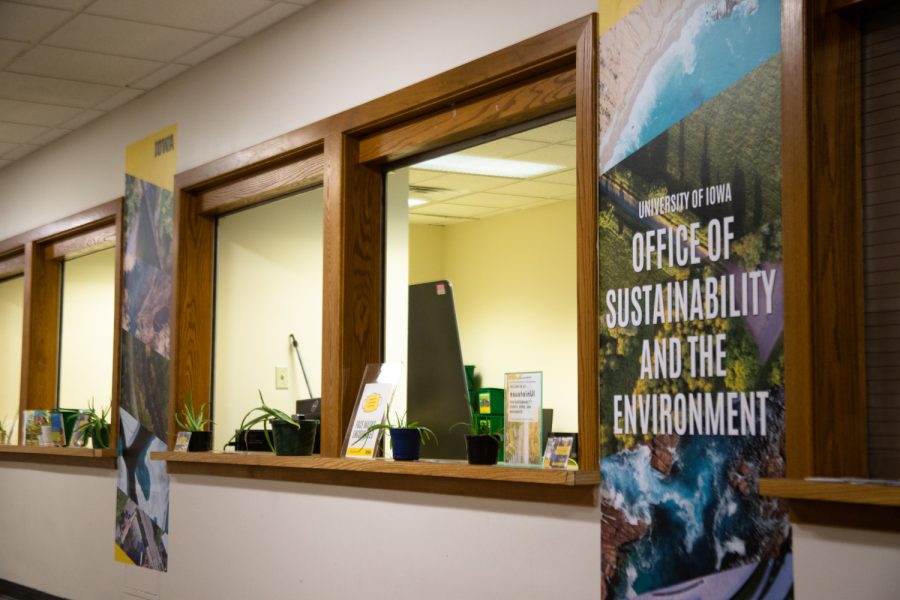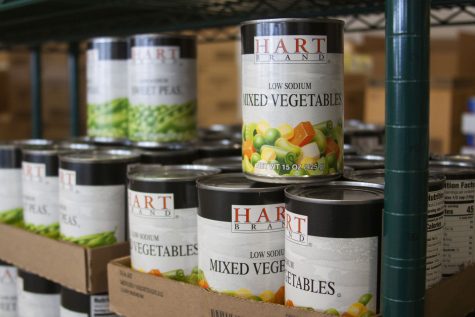Opinion | Sustainability education needs precedence
The University of Iowa increases sustainability-focused programs. We need more sustainability education in schools.
The University of Iowa Office of Sustainability is seen at Jesup Hall at the University of Iowa on Thursday, Sept. 7, 2021.
November 28, 2021
In elementary school, we learned about beehives, rocks, metamorphosis, and color wheels. After bees and butterflies, we studied photosynthesis, the solar system, and basic anatomy in middle school. In high school, we learned more complex science, like biology, chemistry, and physics.
The science taught in schools is essential for students to understand the world around them. Yet, this education often does not address many of the most urgent crises facing the world today: climate change, famine, renewable energy, and public health.
Science education is necessary in schools, but sustainability-focused education is just as important. We need sustainability-focused curriculum in K-12 schools in order to address the crisis that threatens the future.
Though 86 percent of teachers believe climate change should be taught in the classroom, 55 percent of teachers do not cover the topic. Of those teachers, 65 percent do not teach climate change because it is outside their subject area. This means sustainability education is not present in most classrooms.
Though sustainability courses are not offered in most schools, many students understand its importance.
The University of Iowa recognizes interest in sustainability among incoming students.
The UI has made an effort to mobilize sustainability education. In 2021, the UI integrated sustainability into graduation requirements for the College of Liberal Arts and Sciences starting next summer. Additionally, the UI created a Master of Science in Sustainable Development Program.
“Now what we’re seeing is students are starting off in those majors” Blake Rupe, UI Sustainability Program Manager, said in an interview with the Iowa City Press Citizen. “So it’s like, they have a certain level of information, education and awareness about the world when they come on to our campus.”
Among young people, sustainability is a primary concern. In a global study released by Bath University in September, 83 percent of respondents said they believe people have failed to care for the planet. Nearly 60 percent of people surveyed felt very or extremely worried about climate change.
The best way to combat issues of sustainability is to confront them head on and work to solve them. That is why we need more sustainability education in all K-12 schools.
Sustainability issues include social justice in climate transition, improving labor and working conditions, transitioning to a sustainable food model, and urban development and mobility. Not only does sustainability touch every subject, but all subjects are necessary in solving these issues.
That is why sustainability education needs to be apparent and abundant in K-12 education.
The future depends on the actions we take now. Education is key to encouraging people to change their attitudes and behavior. Teaching young people about sustainability is the best hope for creating sustainable living.
Though the work the UI has done for sustainability is commendable, this education needs to start before college.
We need to teach topics of sustainability to younger students. This includes subjects like recycling, the food system, how a changing climate hurts the poor, problems of sanitation, and the importance of clean air and water.
We need to teach how to solve these problems to middle school and high school students. Classes like biology, chemistry, anatomy, and environmental science are all part of sustainability. So, we need to move education from the classroom and into the real world. This should happen in all classes: world language, social studies, English, and math.
Ignoring issues of sustainability will only make crises worse. We need to act now because the future depends on it. That is why schools need a sustainability-focused curriculum.
Columns reflect the opinions of the authors and are not necessarily those of the Editorial Board, The Daily Iowan, or other organizations in which the author may be involved.














